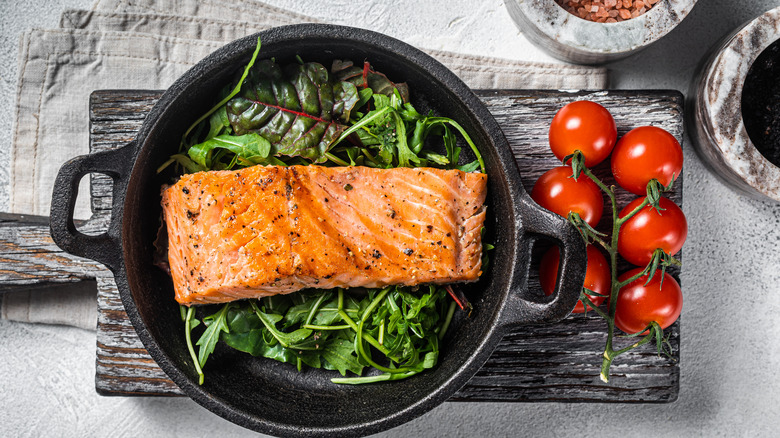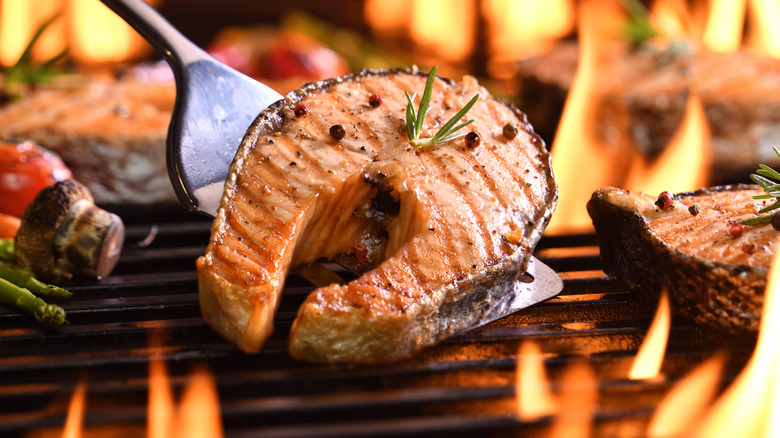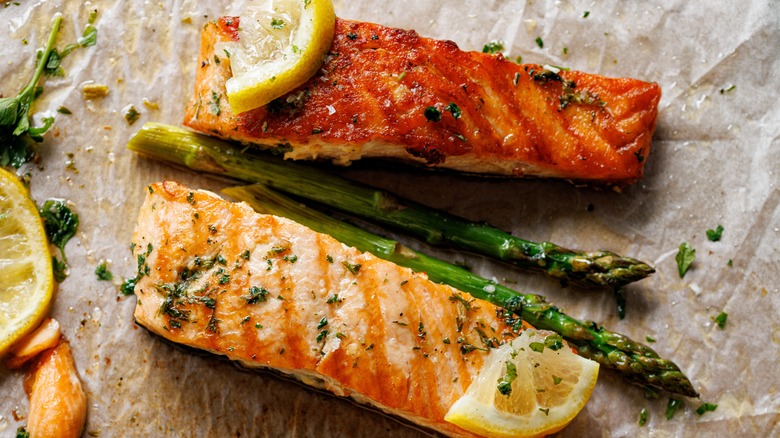How To Adjust Your Salmon Seasoning For Baking Vs. Grilling
There are just so many reasons to love salmon at any meal. First, there are obvious health benefits. After all, Omega-3 fatty acids do everything from supporting hormone production to reducing inflammation. Though farmed salmon is an impressive powerhouse of the Omega-3 fatty acid benefits (because of the fish's specially formulated diets), wild salmon is no slouch either. Salmon is available fresh, frozen, or canned, which lends itself to accessibility in a variety of budgets, storage, and preparation. And most importantly, it's delicious. However, the way fresh salmon is prepared dictates how it should be seasoned, according to Food Network.
Grilling salmon is one of the most delicious ways to prepare salmon — the skin gets charred and crispy, the meat stays soft and tender, and the grill lends a gentle, smoky taste. However, that grill's direct heat is the reason salmon requires some extra attention when it comes to seasoning.
The Thrill of the Grill
To avoid the fish sticking to the direct heat of the grill, all sides of the salmon, including the skin, should be gently patted dry to remove any excess water. Then, brush oil on both sides of the fish before any seasonings are applied. When it comes to seasonings, be careful with your choices because the grill is so hot, some spices or sauces might scorch. Cooking with sugary ingredients (honey, maple syrup, etc) is often best kept as a glaze towards the end of the cooking process. That is because the heat of the grill can burn some sweet ingredients, turning them bitter, per Food Network. Using it towards the end of the cooking process means the sugar isn't cooked over high heat for a long time, leaving it less likely to scorch.
Additionally, if grilling salmon, be careful with how long marinades are left on the fish. Marinades, while a tasty and effective way to infuse food with flavor and seasonings, often have an acid in them (citrus juice, vinegar, etc) and that acid can actually start to cook salmon if it's left to marinate too long.
Take it Easy and Bake it
Keep marinating time to 30 minutes to keep the flavors going and the salmon from overcooking once the actual heat hits the fish. If this all sounds too complex or if you don't have access to a grill, baking is the way to go. It's even more simple to make because you don't have to brush the fish with oil unless you want to do so. The indirect heat means there's less concern of the fish sticking to the pan, says Food Network, and any sugary marinades or seasoning aren't in danger of burning, so season away. That said, the concern of marinating too long still stands, so keep the marinating time to a minimum.
When it comes to flavors themselves, run wild with anything from fresh and dried herbs to spice blends, flavorful sauces, and marinades (Food Network recommends mayonnaise, which is known to keep salmon moist), and citrus juices and zests. Now that you know how to cook salmon, it's time to get eating.


